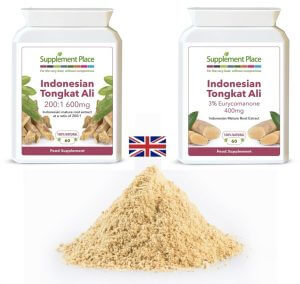
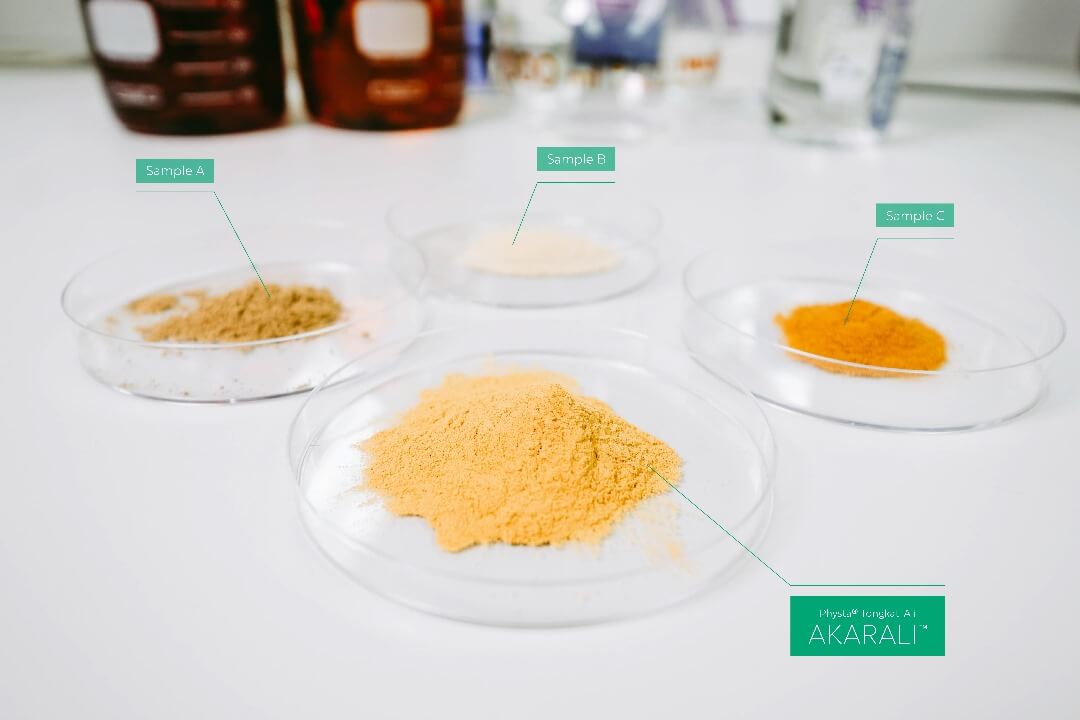
At first, 200:1 Tongkat Ali may appear the best Tongkat Ali that you should buy. In fact, most Tongkat Ali supplements sold in the US are marketed using 200:1 extract, thus perceived as being the best Tongkat Ali that money can buy.
The truth is, that the most underrated and potent Tongkat Ali uses standardized extract.
This article irons out the facts behind the Tongkat Ali extraction ratio. Whether you are choosing 200:1 or 100:1 Tongkat Ali extract, consumers are now switching to standardized Tongkat Ali extract as a marker for efficacy and quality.
We shall go deep into explaining the mechanics behind Tongkat Ali extraction ratio, the types of Tongkat Ali extract and which type of Tongkat Ali extract is the most potent.
Standardized Tongkat Ali extract is developed by measuring the amount of at least one or two phytochemical compounds (eg: eurycomanone, eurypeptides, glycosaponin and polysaccharides) that have been researched and identified as having beneficial effects at a certain level.
“It’s much more common to standardize extracts to a marker of potency and consistency.” says Dr. Bill Rawls, Medical Director of Vital Plan.
200:1 Tongkat Ali extract is often overhyped as being the best, but that is not the case with premium standardized hot water extracts.
On the other hand, 200:1 Tongkat Ali extracts are generally non-standardized, making it less potent due to variability in the key bioactive compounds that are beneficial to health.
“When herbs are not standardized, meaning they haven’t been tested to determine how much of certain chemical components they contain. This makes it hard to judge quality and potency” says Dr. Rawls.
Our bioavailability analysis of Tongkat Ali samples of 200:1 extract sourced from Indonesia, an ethanol-based standardized extract and a standardized hot water extract showed a large variance in eurycomanone, eurypeptides and glyocasponin content. This means Tongkat Ali 200:1 supplements sold in the market today are not necessarily the strongest, or the most potent as reported by many users.
Bioactive Compounds | 200:1 Tongkat Ali Extract | Standardized Ethanol Extract | Standardized Hot Water Extract
|
Eurycomanone | <0.2% | 0.3%-3% | 0.5%-1.5% |
Eurypeptides | 10% | 15-20% | 20%-30% |
Glycosaponin | 10%-15% | 10-30% | 30-40% |
Polysaccharides | 20-30% | 20-30% | 30-55% |
Crude Protein | 10-20% | 20-30% | 20%-40% |
Calcium | – | – | 2.0% |
Potassium | – | – | 1.5% |
Magnesium | – | – | 2.2% |
Isoleucine | – | – | 0.15% |
Potency | Least Potent | Medium Potency | Highly Potent |
Efficacy | Low | Medium | High |
“Most Tongkat Ali extract today is produced from chipped Tongkat Ali (branches or roots) using organic, ethanol or water as solvents to isolate bioactive compounds. This process often involves heat and pressure” said an industry expert.
For instance, hot water Tongkat Ali extract is produced by boiling Tongkat Ali raw powder between 80 to 100 degrees Celsius for up to 4 hours to extract eurycomanone, eurypeptides, saponin and other bioactive ingredients.
According to industry experts, you may get higher eurycomanone but lower saponin and eurypeptides in 200:1 Tongkat Ali, but it does not guarantee it produces high percentage of saponin, calcium, potassium and magnesium – which is crucial for optimal testosterone production and other health benefits.
“Standardized hot water extract offers greater benefits than ethanol-based 200:1 Tongkat Ali extracts as it does not contain impurities, minerals or other phytochemicals that are not beneficial to health” said Dr. Annie George, Head Scientist of Biotropics.
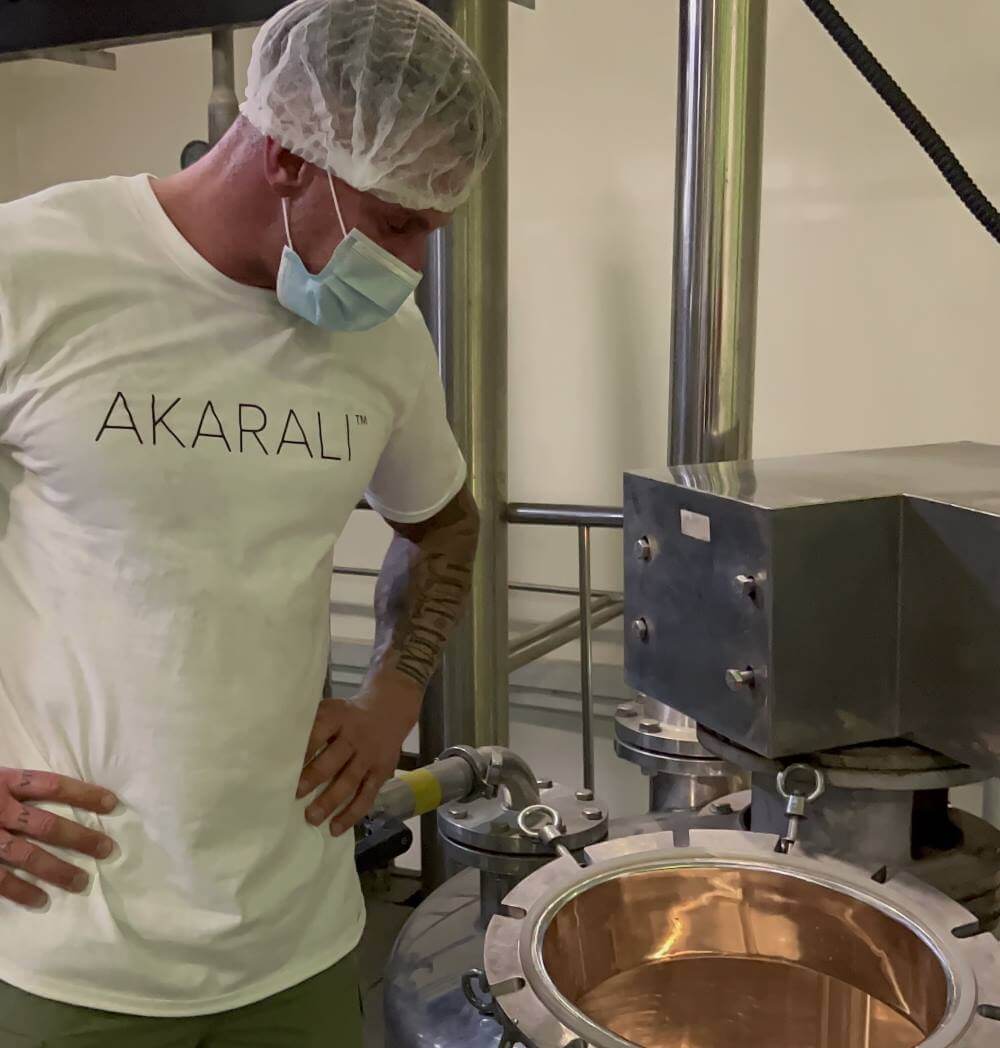
The above image shows the initial stages of a Tongkat Ali extraction process using the hot water extraction method (credit: AKARALI)
“Tongkat Ali extracts that are standardized to Malaysian Tongkat Ali Standards MS2409 enable an optimal percentage of bioactive compounds to be produced during each batch of production.” said Dr. Annie in the interview. According to many health experts and herbalists, standardized Tongkat Ali extract is regarded as the highest quality standard in the nutraceutical industry, making it relatively safer for long-term use due to high safety limits of up to 1,930 mg of dose in a single intake.
At the same time, we found that most mainstream manufacturers are still glued to the vanity extraction ratios (of 200:1 and 100:1) that may not guarantee the same level of bioactive ingredients offered by brands that use standardized hot water extracts.
The term 200:1 Tongkat Ali refers to the process by which 200 kilograms of raw Tongkat Ali root is used to produce 1 kilogram of concentrated extract. 200:1 extract is commonly used and found in 80% of the Tongkat Ali supplements sold in the US market, making it relatively popular for first time buyers.
Effectively what it means is the following…
For a 200mg per capsule Tongkat Ali that used 200:1 extract, 40,000 grams of raw Tongkat Ali root were used in the final extraction process. It is believed that the higher the ratio, the more potent and concentrated the extract is expected to be, but in reality, standardized extract delivers higher potency and consistency based on various studies published by industry experts.
Pure Tongkat Ali extract refers to the highest grade of a given Tongkat Ali extract and often contains no additives, preservatives, or fillers. It is often a product of a standardized extract protocol by adhering to accepted levels of bioactive compounds that are deemed beneficial to health.
Pure yellow Tongkat Ali powder extract has a distinct yellow color with goldish undertones. However, the addition of fillers found in most US-made Tongkat Ali supplements may change the color to pale white with a hint of yellow undertones. The addition of maltodextrin found in 200:1 Tongkat Ali extract
Tongkat Ali extract with a pale white-yellow color is highly likely due to the excessive addition of maltodextrin or fillers.
Our lab analysis of the samples of various Tongkat Ali extracts on the bottom left shows a mixture of 20% Tongkat Ali pure extract + 80% maltodextrin (filler), which changes the color composition to pale white with a tint of yellow.
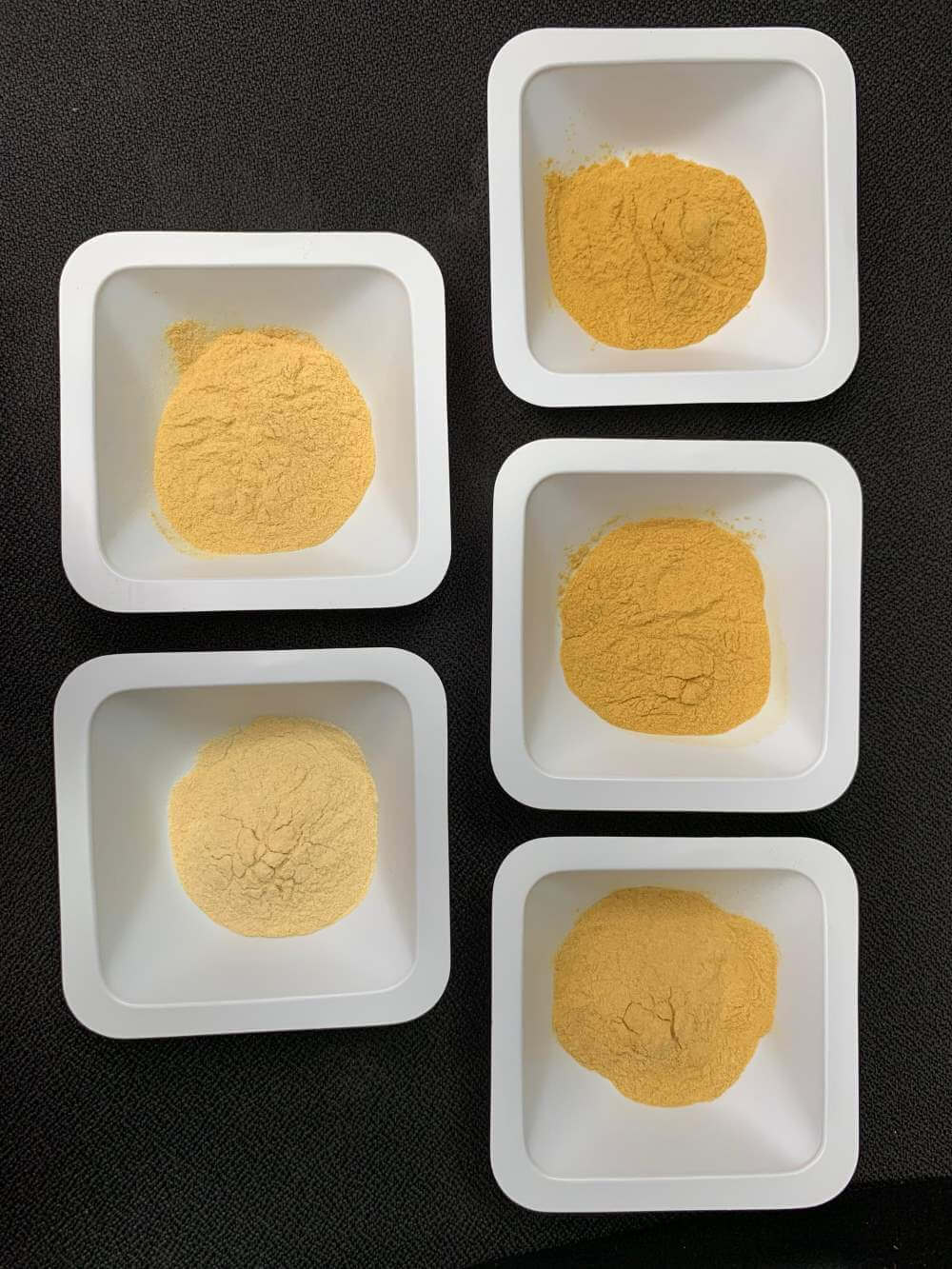
Tongkat Ali extract ratio of 200:1, 100:1, 50:1 or 20:1 doesn’t represent a measure of efficacy, nor does it represent the strength or potency of Tongkat Ali supplement. In other words, considering it has fewer eurypeptides and glycosaponin, 200:1 Tongkat Ali extract may be less potent than a 100:1 extract.
In short, 200:1 Tongkat Ali supplement may not necessarily work to deliver optimal health benefits.
If potency and bioavailability do not matter to you, then 200:1 Tongkat Ali should be your choice. However, 200:1 Tongkat Ali extract may not guarantee optimal health benefits as claimed in many research studies or clinical trials. Highly likely you may experience a lower testosterone boosts, or mild libido effects from taking 200:1 Tongkat Ali extract.
Based on many real-world applications, 200:1 Tongkat Ali extract is not preferred by athletes or in sports activities as it does not deliver optimal performance due lower potency. Users are advised to buy standardized hot water Tongkat Ali extract to enhance sports performance, testosterone or libido effects.
Standardized Tongkat Ali extract may work better for testosterone and libido than 200:1 extract due to a higher percentage of eurypeptides (i.e polypeptides from a chain of amino acids) that helps to release free testosterone from binding protein more efficiently which helps muscle growth and libido. While 200:1 Tongkat Ali extracts may contain 3% eurycomanone as the only marker, standardized Tongkat Ali extracts achieves the optimal balance of eurycomanone (1.5%), eurypeptides (20-30%), polysaccharides (30%) and glycosaponin (>40%) that is crucial for maximum benefits and long term use.
Tongkat Ali extract often refers to Tongkat Ali powder that has gone through an extraction process, which often have higher potency and efficacy from higher concentration.
Tongkat Ali ground powder has a coarse texture, often not soluble, and is produced by grinding the Tongkat Ali plant into the required specification. Unprocessed Tongkat Ali powder sold by suppliers to China and the US does not dissolve completely in water and which may harm your kidneys.
On the other hand, fine Tongkat Ali extracts are often referred to as fine powder extracts that are water-soluble and perform better due to higher absorption. It is mainly used in clinical studies due to its stability and repeatability to deliver better pharmacological responses and health benefits.
Hot water Tongkat Ali powder extract is shown in multiple clinical human studies to have higher protein synthesis and energy conversion which release more free usable testosterone that benefits libido, muscle growth and energy.
When extraction ratios are used to define the Tongkat Ali extract, it suggests X amount of raw Tongkat Ali material was used to produce Y amount of extract.
This gives the consumer the impression that more bioactive compounds are present in an extract if the extract ratio of X:Y were high.
For an example a consumer may think a 100:1 extract A is more potent that a 10:1 extract B because for a 100 mg supplement the product A may be more concentrated than B.
The same can be said for 200:1 Tongkat Ali extract. Many believe 200:1 Tongkat Ali extract is stronger than 100:1 extract, but this is not the case as when high amounts of raw material is used, it may also represent poor and inefficient extraction to achieve the same standardized active compounds by other extraction ratios.
In other words for every 1 kg of extract A, it is the perception that 100 kg ‘dry herb equivalent’ raw material was used for extraction compared to extract B which utilized 10 kg.
However, this is misleading and incorrect.
For example
100 mg 100:1 Tongkat Ali extract containing 1% Eurycomanone
100 mg 10:1 Tongkat Ali extract containing 1% Eurycomanone
In this example both the extracts are standardized to 1% Eurycomanone. The extract with a higher extraction ratio 100:1 did not have 10X more Eurycomanone, in other words 10% Eurycomanone.
It also gives the impression that if we consume the Tongkat Ali raw roots (dry herb equivalent), we will get the same benefit as the extract. This too is not true as the whole purpose of extraction is to extract the bioactive compounds that would otherwise be locked in the dry herb and not be bioavailable.
If one relies on Tongkat Ali extract ratio, they could risk being underdosed as they might be tempted to reduce the dose if they find the extract is a product of higher extract ratios.
When the consumer no longer experiences the benefits of the Tongkat Ali extract, they may get mis-jaded and conclude that the Tongkat Ali supplement is ineffective.
To ensure that one is getting the best benefits from Tongkat Ali extract, standardizing the level of eurycomanone, eurypeptides, saponin and total protein is key to deliver a holisitic 360 health benefits.
The standardization ensures that the right amount of bioactive compounds are present in the extract to ensure you are getting optimal benefits. Most of the Tongkat Ali studies on the health benefits are based on standardized extract, and Malaysia is the country that produces quality Tongkat Ali standardized extracts as reported by The New World Report, Reuters and ABC News.
Clinical urologist Dr. Ismail said “For it to work on humans, Tongkat Ali standardized extracts are the ones used by doctors and research scientists. The 200:1 Tongkat Ali extract has never been the benchmark for research or clinical use.”
Head scientist Dr. Annie George from Biotropics added that Tongkat Ali extract ratio is not the determinant for potency nor efficacy, thus consumers should not fall into the trap believing 200:1 Tongkat Ali extract is the best extract.
To illustrate this, we secured several Tongkat Ali extracts in the market defined by extract ratios, of 200:1, 100:1 and comparing it with standardized extract.
Testing for the standardized markers of Eurycomanone, Glycosaponin, Protein and Polysaccharide twenty-three samples were analysed at the in-house chemistry laboratories in Malaysia.
The compilation of the analysis is shown below:
Table 1: Tongkat Ali extract from various suppliers (undisclosed) with bioactive compounds as tested in a Chemistry laboratory
Source | Sample Label | Eurycomanone (%w/w) | Total Protein (%) | Total Polysaccarides (%) | Glycosaponin (%) |
Malaysia | Standardised Tongkat Ali water extract according to Malaysian Standards MS2409:2011 | 0.8-1.5 | ≥22 | ≥30 | ≥40 |
Indonesia
| XX One Hundred | 0.53 | 25.37 | 46.66 | 30.6 |
TA 10:1 | 0.15 | 0.80 | 81.20 | 7.50 | |
TA 20:1 | 0.20 | 0.60 | 83.00 | 19.4 | |
TA 50:1 | 0.51 | 6.92 | 69.20 | 28.3 | |
Malaysia | Tongkat Ali Powder Extracts (100:1) | 1.23 | 26.7 | 31.30 | 52.5 |
Japan | Tongkat Ali 100 fold Concentrated | 0.80 | 21.55 | N/A | N/A |
China 1 | 200:1 | 0.05 | 0.10 | 80.80 | 3.70 |
100:1 | 0.06 | 0.10 | 81.00 | 3.80 | |
200:1 (Source 2) | 0.25 | 6.20 | 58.50 | 44.70 |
Note: The names of the supplier for the extracts above is undisclosed. Based on the Table above, it is apparent that the extracts based on extract ratio do not represent a more potent version of the standardized extract if one were to use eg. Eurycomanone as the indicator.
The ones described based on the higher than 1.5% Eurycomanone content {China (1) and (2)} has not been clinically validated for safety or toxicology. Furthermore, the extract with high content of Eurycomanone is possibly produced by organic solvent extraction which is not the method used in traditional preparation for which safety and efficacy is available.
The standardized Tongkat Ali aqueous extract standardized according to Malaysian Standards (MS) 2401:2011 is the only extract with extensive clinical studies demonstrating safety and efficacy.
The purest Tongkat Ali (Eurycoma Longifolia) extract that you can find in the market today is sourced from 100% Tongkat Ali root harvested from mature Tongkat Ali plants using a 100:1 or 50:1 extraction ratio which is standardized to 1.5% eurycomanone, 22% eurypeptides and 40% glycosaponin of the total bioactive content. This is deemed “pure” by industry standards set by the Malaysian Tongkat Ali standard MS2409 due to the optimal bioavailability of the individual bioactive compounds that are believed to be relatively potent.
AKARALI Physta standardized hot water extract is one example of pure Tongkat Ali root extract that contains no fillers or additives, which is highly reputable and popular in mature markets such as the US, UK and Australia. The powder extract has a distinct strong goldish-yellow and highly hygroscopic nature that reflects its purity in its natural form and highly bitter.
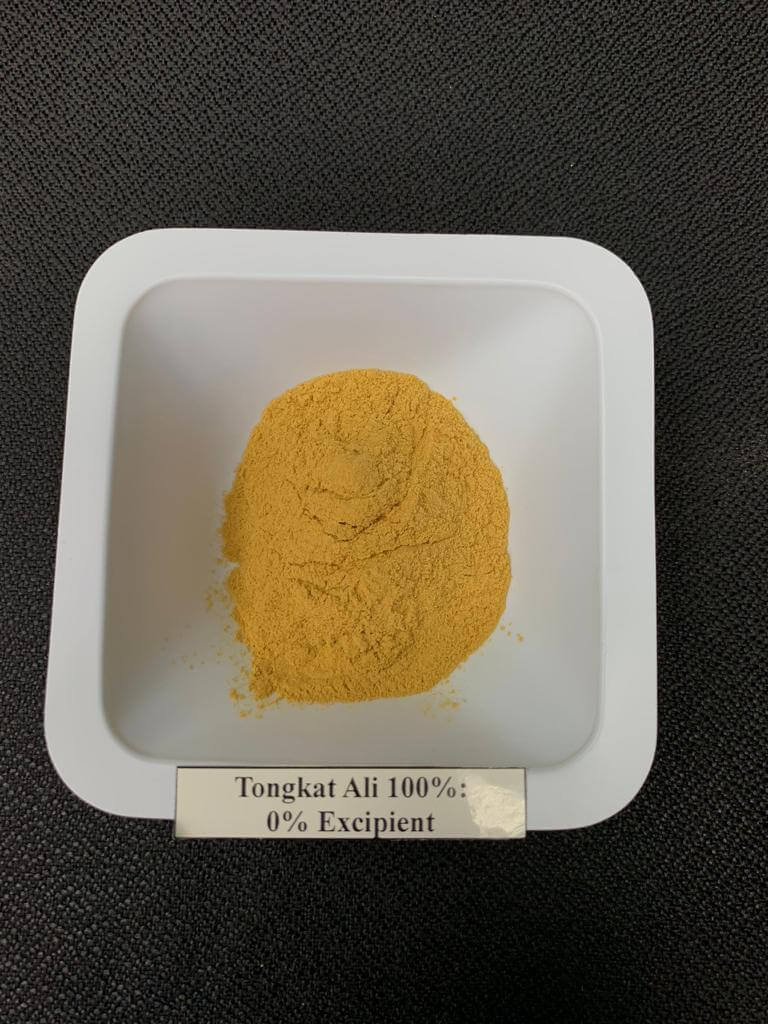

AKARALI is one of the reputable Tongkat Ali brands in the US that uses pure Tongkat Ali root extract which works for men’s libido, testosterone, energy and muscle growth. You may find a wide selection of pure unadulterated Tongkat Ali products on its online shop that comes with worldwide delivery to US, UK, Europe, UAE and Australia.
If you want affordable Tongkat Ali supplements, DoubleWood 200 to 1 Tongkat Ali, NatureBell Tongkat Ali and Indonesian Tongkat Ali are the best-selling 200:1 Tongkat Ali in the US. However, most 200:1 Tongkat Ali extracts are not clinically tested to work and the efficacy is highly in question. In addition, 3rd party lab reports showed that it may contain lower potency (from the excessive addition of maltodextrin) compared to higher-grade standardized Tongkat Ali extracts.
200:1 Tongkat Ali extract is considered good as a daily supplement if it has gone through a standardization process and 3rd party lab tests by reputable organizations such as EUROFINS.
When buying 200:1 Tongkat Ali, the first step is always check on the color of the extract. Lighter yellow denotes that the extract contains a high amount of binders (or fillers) that are filled with maltodextrin. Excessive maltodextrin does not contribute to the effectiveness or efficacy of Tongkat Ali. In fact it does the opposite by diluting the efficacy, thus it may not work as effectively compared to pure 100% Tongkat Ali standardized extract.
Do check out the image gallery below to find out how the color changes when maltodextrin (binder) is added to Tongkat Ali extract.
Consumers should be careful when buying 200:1 Tongkat Ali extract as it may not be the most potent, or strongest Tongkat Ali. The extraction ratio provides a false impression as it is not used as an efficacy measure to deliver the intended benefits.
On the other hand, Tongkat Ali standardized extract is the clear winner here as it performs better in most cases due to the wide range of efficacy tested on men and women. The toxicology of standardized Tongkat Ali extract is known to have fewer side effects which gives an overall balance between efficacy, long-term use, safety, and positive pharmacological effects on health.
Only a few reputable and trusted Tongkat Ali brands such as AKARALI are using a standardized extract that conforms to the Malaysian Tongkat Ali Standards MS 2409 which delivers higher efficacy than most 200:1 Tongkat Ali extracts in the market today.

Naressa Khan contributes regularly on AKARALI. As a researcher and investigative journalist, Naressa is all about creating, deconstructing, and reassembling meaningful content through words and facts. With this approach always in mind, she eagerly explores the nuances in life via the aspects of lifestyle, culture, travel, health, and wellness in Malaysia .
Our articles are third party reviewed by our panel of experts and medical advisors to ensure the facts are accurate and credible. These are validated against multiple source references which include but not limited to research studies, peer-reviewed journals, pre-clinical studies, clinical tests and other credible publications.
Our panel of medical advisors and experts are highly experienced in their individual fields. However, they do not provide any medical advice or recommendations arising from content published in this article.
Disclaimer:
The content published on this website is for educational purposes and should not be viewed, read, or seen as a prescription or constitute any form of medical advice. We recommend you consult your nearest GP or doctors before consuming Tongkat Ali or any products which contain Tongkat Ali. For further information, kindly refer to our Frequently Asked Questions (FAQ) for more information.